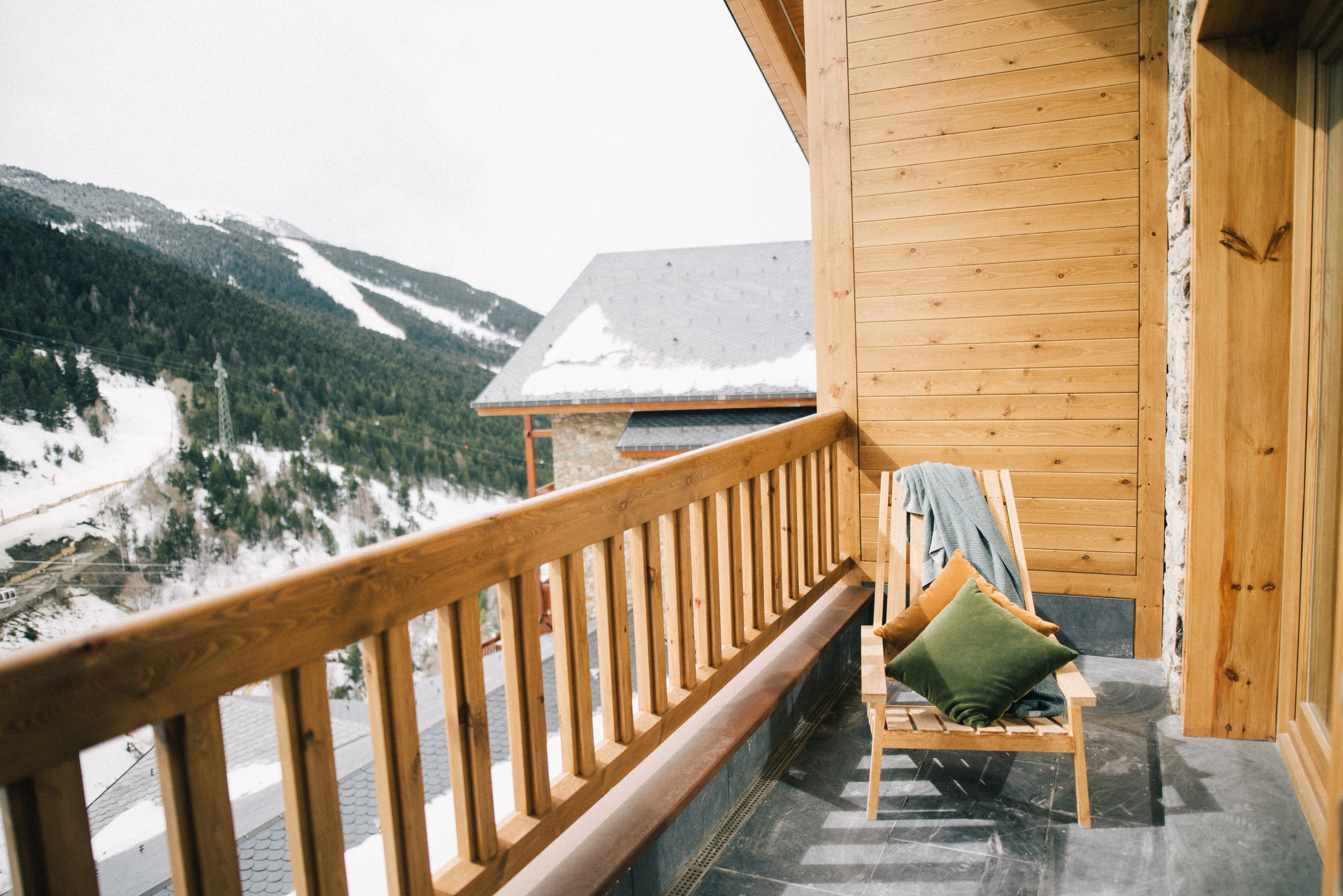The Pros & Cons of Hosting a 4 Seasons Vacation Rental

It’s no secret that taking advantage of the changing seasons can be an incredibly profitable venture for vacation rental property for any real estate owner. However, there are many factors to consider before making this decision: from managing guest expectations and dealing with liabilities to navigating varying local laws.
In this blog post, we will explore some pros and cons of running a 4 season vacation rental business among others in vacation rental markets — including what you need to know before making it an investment property and signing up for an agreement. From ensuring client comfort and boosting profits year-round to dealing with weather-related damages and maintaining steady occupancy rates, read on for all the details!

Short-Term vs Long-Term Rentals
Short-term rentals are ideal for those who are looking for a flexible, convenient option for accommodation. They often offer more luxurious amenities and increased privacy than traditional hotel stays. Moreover, such property always has a place for primary residence and provides additional perks.
Short-term rentals usually have more of a homey, lived-in feel and come with the added convenience of being able to check in and out quickly without having to make prior arrangements.
On the other hand, long-term rentals such as 4 season vacation rentals provide stability and consistency over a period of time. Tenants are able to establish themselves in a fixed location and build relationships with their neighbors.
Furthermore, long-term tenants enjoy lower rates due to the extended duration of their stay. Some elderly people even transform it into a retirement home or family reunion place. So, landlords can be sure that they will receive regular payments as long as they continue renting out the property. Besides that, property rented by a long-term tenant is looked after by him.
Pluses and Minuses of Short-Term Rentals
Short-term rental markets offer a variety of advantages and disadvantages for both renters and owners. On the plus side, short-term rentals provide flexibility for renters who don’t want to commit to a long-term vacation rental lease, as well as more tax deductions available for owners. Additionally, there is less wear and tear on the property compared to long-term rentals.
On the downside, a short-term market has a much higher vacancy rate than a long-term vacation rental, making it difficult to predict monthly income. They also require more effort to run due to the need for constant cleaning and maintenance costs. Furthermore, there is more risk involved with short-term rentals since they are more susceptible to seasonal vacancy and bad tenants can cause significant damage in a short period of time.
Pluses and Minuses of Long-Term Rentals
Long-term rental properties offer a variety of pros and cons for both renters and owners.
On the plus side, long-term tenants are more likely to stay in the space for a longer period of time, increasing the overall income potential for the real estate owner. Additionally, it’s typically easier to find tenants since there is more stability involved with longer leases.
On the downside, long-term vacation rental leases may require more upfront costs such as initial tenant screening fees and security deposits. Additionally, landlords may be unable to raise rent prices during a lease period if housing market values rise due to local or economic conditions. Furthermore, there can be legal risks with long-term vacation rental agreements if they’re not structured correctly.
Advantages of Hosting a 4-Seasons Vacation Rental
Hosting 4-seasons vacation rentals is an excellent way to make positive cash flow while providing your guests with an unforgettable experience. Here are some major advantages of owning a four seasons vacation rental business.
Low Maintenance Costs
Owning a vacation rental property can be a lucrative investment, but with great rewards comes great responsibility while managing short-term rentals. However, choosing vacation rentals may be a smart move for those looking to minimize operating costs.
With the unpredictable weather patterns in many parts of the world, having a short-term rental business that can withstand any season is a huge advantage. This means less money is spent on repairs and renovations due to weather-related damages.
Additionally, the constantly changing scenery of each season can add a unique appeal to the same property, attracting a wider range of renters.
Flexible Scheduling
Rent out your property when you want and for as little or as much time as you can manage. This provides you with the flexibility to make a steady income but still have time for yourself, your family, and other activities.
Increased Income Opportunities
Hosting 4-seasons vacation rentals can do wonders for your potential income opportunities. Imagine making positive cash flow all year round, rather than just during peak travel seasons. With vacation rentals, you can offer a luxurious place for people to stay during the winter and summer, as well as the transitional seasons.
This opens up the potential for increased revenue and can help you maximize your rental income from real estate throughout the year. So, whether you’re looking for a way to boost your finances or to capitalize on your vacation property investment strategy, choosing to transform your property into a 4-seasons rental can help you accomplish both.

Disadvantages of Hosting a 4-Seasons Vacation Rental
While it may seem appealing to have a vacation rental property that is available year-round, hosting a 4 seasons rental also comes with its downsides as tax obligations and other commitments.
Seasonal Fluctuations in Occupancy Rates
One significant disadvantage is the seasonal fluctuations in occupancy rates. Take for example Jasper, a popular ski resort town. During winter months, it may soar, as skiers flock to the area for their winter pursuits. However, during the summer months, occupancy rates may plummet, as the ski crowd thins out and vacationers seek beach destinations instead.
This can create major financial issues for vacation rental owners, who need a consistent rental income to keep their vacation properties viable. Ultimately, despite the allure of a year-round rental, hosting a four seasons vacation rental property requires careful consideration and planning to avoid financial pitfalls.
Potentially Higher Costs for Utilities and Supplies
As the popularity of vacation rentals grows, so do the potential costs for hosts. For those running a 4-seasons vacation rental business, one disadvantage to keep in mind is the potential for higher utility and supply costs for this real estate. In regions where temperatures fluctuate drastically between seasons, hosts may need to supply heating and air conditioning to keep guests comfortable year-round.
Besides temperature, the cost of maintaining outdoor recreational equipment such as hot tubs or winter sports gear can add up quickly. While these costs may require extra effort and planning, savvy hosts can find vacation rental strategies to minimize them and ensure a profitable experience for all parties involved.
Dealing With Unpredictable Weather Conditions
Hosting 4 seasons vacation rentals can be a lucrative business, but it can also come with its own set of challenges. Among them is dealing with unpredictable weather conditions. That’s when it can become a real disadvantage of owning such a property.
Imagine having guests scheduled to arrive during winter when snow is expected, and instead, they come during a heavy rainstorm. This can negatively impact their experience and ultimately hurt your business.
As a vacation rental owner, it’s essential to plan, have a backup plan, and communicate with your guests to ensure their stay is comfortable and enjoyable despite the continuously changing weather conditions.
More Complicated Pricing Strategies
Unlike hotels or resorts, which typically have a fixed pricing model, short-term rental and long-term rental need to constantly adapt to changes in demand and seasonality. This requires a more complicated pricing strategy, often involving dynamic pricing algorithms, which can be daunting for novice hosts.
Nevertheless, with some research and guidance, hosts can develop effective pricing plans that strike the right balance between affordability and profitability.
To make adjusting prices easier, iGMS has just the tool. The Channel Markup feature empowers you to update your pricing on multiple channels automatically.
Different Needs and Expectations from Guests
Guests have different preferences, and catering to every one of them can be a significant challenge for real estate owners. Some guests may prioritize comfort, while others may be more concerned about luxury amenities.
Moreover, individuals have different vacation styles. Some want to relax in peace, while others are looking for adventure and exploration. Therefore, hosts providing 4-seasons vacation rentals must understand the different needs of their guests to provide an unforgettable experience.
Tips for Making Your 4-Season Vacation Rental Stand Out
When it comes to 4-season vacation rentals, it’s important to find ways to set your space apart from the competition. Whether you’re located in a popular destination or off the beaten path, there are a few key elements that make guests want to choose your rental over others and get a cash flow.
Spice Up Your Listings with Unique Amenities
When it comes to vacation rental listing for a vacation rental, unique amenities can make all the difference. Sure, a cozy bed and a stocked kitchen are important, but what about a private hot tub overlooking the mountains or a ping pong table for family game night?
Guests are looking for experiences, and providing unique amenities can elevate their stay from average to unforgettable. And don’t be afraid to get creative – how about providing yoga mats, a telescope for stargazing, or even a cooking class with a local chef?
These one-of-a-kind touches will not only attract more bookings but will also generate positive reviews, which is vital in the competitive world of short-term vacation rentals. So why settle for ordinary when you can spice up your rental listings with exceptional amenities?
Include Photos and Videos of the Property to Showcase the Space
Are you looking to rent out your vacation home, but not sure how to make it stand out amongst the crowd? Including high-quality photos and videos is the way to go!
By showcasing your real estate through visual means, interested renters will be able to get a clear sense of what they can expect when they arrive.
Whether it’s the breathtaking views from your balcony, the cozy fireplace in the living room, or the fully equipped kitchen, make sure to capture it all in stunning detail. Not only will this set your property apart, but it will also make a lasting impression on potential renters.
Utilize Social Media to Promote Your Property
Utilizing social media to promote your rental property is not an exception. By establishing a strong online presence, you can showcase your property’s unique features, amenities, and location to potential renters and get more income.
Through eye-catching photos and engaging captions, you can pique their interest and entice them to schedule a showing.
Social media is an excellent platform to address any questions or concerns that potential renters may have, fostering a transparent and trusting relationship between you and your future tenants. Moreover, guest reviews can cause guest communication and attract more customers.
Offer Special Deals During Non-Peak Times
To attract tenants during non-peak times, you can offer special deals and discounts to make your rental property more appealing. Consider setting up discounted rental packages that include waived application fees or reduced deposits.
You could also offer additional services such as free cleaning services once a month or flexible payment plans that allow tenants to pay the rent in installments.
Moreover, you can provide tenant rewards and loyalty programs that give them access to discounts on local attractions and restaurants near your real estate or other vacation rentals. Offering these deals during slow months will help you fill vacancies quickly with desirable renters.
Consider Offering Longer Stay Discounts
Consider setting up discounted weekly or monthly packages that include reduced deposits, waived application fees, and flexible payment plans. Additionally, you can provide additional amenities such as free Wi-Fi or cable TV, free cleaning services once a month, or tenant rewards and loyalty programs with discounts on local attractions and restaurants.
Offering long-term stay discounts will help to attract tenants who are looking for extended stays and fill vacancies quickly.

How to Prepare For Each Seasonal Change
As a property manager of a 4-season vacation rental, it is important to prepare for each season ahead of time. Make sure all maintenance and repairs are completed before the start of each season to ensure your guests have a pleasant experience.
Create an Adaptable Cleaning Schedule
An adaptable cleaning schedule is important for vacation rental properties to maintain a high level of cleanliness.
- Develop a comprehensive list of areas to be cleaned and inspections to be made in each room in a vacation home.
- Be sure to provide your cleaning staff with the right supplies, such as disinfectants and sanitizing products, as well as proper safety protocols.
- Consider separating routine maintenance such as furniture dusting from deep cleaning duties, and establish standards for items that should always be checked before every check-in such as bathroom surfaces and windows.
- Ensure you are flexible with your scheduling so that last-minute changes can be easily accommodated.
- Develop an emergency plan for your real estate in case of unexpected messes or problems that need extra attention.
Invest in Different Types of Furniture
Different seasons and climates call for different types of furniture, such as outdoor furniture for sunny days or cozy blankets and throw for cooler nights.
Purchasing quality furniture will help make sure your guests feel comfortable in their rental and encourage them to come back again. Furniture should also be regularly maintained and cleaned in all your vacation rental properties so that it can last longer, saving you money in the long run.
Finally, investing in different types of furniture can also add to the aesthetic of your short-term vacation rentals and make them more pleasing to potential customers.
Don’t Forget About Local Attractions & Reasons To Visit During Every Season
As a vacation rental property owner, it’s important to create a list of local attractions and reasons to visit during every season.
Research the area nearby your real estate to find out what activities are available throughout the year, such as skiing or biking in winter, kayaking or hiking in spring and summer, and apple picking or wine tasting in fall.
If you manage vacation rentals, try to find attractions that appeal to different types of people, from foodies to adventure-seekers.
When creating your list of local attractions, include detailed descriptions about each one along with photos or videos to post on your own business website or social media.
Besides that, offer special discounts for your rental guests who take advantage of these local activities.
Preparing for Unexpected Circumstances That May Arise During Different Seasons
Preparing for unexpected circumstances that may arise during different seasons can help ensure your vacation rental investment is successful.
- In the winter, make sure you have adequate heating and insulation in your rental to keep guests comfortable.
- For summer, consider having a cooling system or backup fans in case of heat waves or power outages.
- During spring and fall, invest in weatherproofing materials like storm shutters or tarps to protect your rental from storms and other weather-related incidents.
- Also, be sure to monitor the forecast for any natural disasters such as hurricanes or floods that could affect your vacation rental property.
- Finally, always maintain a well-stocked emergency kit in case of emergencies such as fires or power outages.
Understand Your Potential Customer Base Before Investing in Your Property
Understanding your potential customer base before real estate investing in vacation rental property or any other real estate is key to ensuring a successful investment.
Start by researching the area surrounding the vacation property and find out what types of activities people typically come to the area for. This will help you determine what amenities or attractions may be attractive to potential customers.
Additionally, look at local demographics and figure out who your main customers will likely be—young families, businessmen, retirees, etc.—and plan your rental accordingly.
Finally, read reviews of similar rental properties to get a better understanding of what guests would expect from their stay and how best to cater to their needs.
Make Sure You Have Enough Space to Accommodate Different Types of Guests Throughout the Year
When renting out 4-season vacation rentals, you should remember that it differs from traditional renting. It’s important to make sure you have enough space to accommodate different types of guests throughout the year.
During peak seasons such as summer and winter holidays, you may need to provide extra beds or additional sleeping arrangements to accommodate large groups.
Consider setting up multiple living spaces within the vacation rental property so that couples or families can have their private area while still being close enough to socialize with other guests.
Be sure to also accommodate any special needs during different times of the year—like providing baby equipment for families with young children or offering accommodations for elderly guests. Finally, keep an eye on trends in different seasons and adjust your rental accordingly to maximize occupancy rates.
Should You Make a Vacation Rental Investment?
Vacation rental investments are becoming increasingly popular as people look for ways to diversify their portfolios and generate passive income. With the rise of online short-term rental platforms like Airbnb and iGMS, it has become easier than ever to rent out properties for short-term stays.
The advantages of this real estate investing include potential tax benefits, increased rental income, and the ability to build equity over time. Also, you can enjoy a steady stream of extra income from your vacation rental properties without having to worry about long-term tenants or maintenance costs.
However, there are also some drawbacks to consider when investing in vacation rentals, like property management fees. These include higher upfront costs due to furnishing and decorating the property, as well as dealing with seasonal fluctuations in demand. You may also have difficulty finding reliable tenants who will pay on time and take care of your property while they’re staying there.
Ultimately, whether you should make a vacation rental investment depends on your financial situation and goals. If you’re looking for a way to generate passive income from real estate and build equity over time, then vacation rentals could be a good investment option for you.
However, if you’re not prepared to deal with the risks associated with this type of investment, then it may be best to look into other options.
Should You Use a Property Management Company for Their 4 Seasons Vacation Property?
Using a property management company is a great way to ensure that your four seasons vacation property runs smoothly. A good property management company will take care of the day-to-day maintenance and upkeep, as well as help you attract and retain tenants.
When it comes to managing a four seasons vacation property, the right timing is key. During peak season, there will likely be more demand for your property, but it’s important to make sure that any potential tenants are reliable and responsible—and this is where a property management company can help a short-term rental owner. They can conduct background checks on potential tenants and help ensure that all rental agreements are properly signed, sealed, and delivered.
Property managers can also help you maximize extra income from the right property during off-seasons. For example, they can help find short-term rentals or provide discounts to long-term guests who stay multiple months at a time.
Additionally, they will handle all taxes, utility bills, fees associated with the rental process, and other expenses. So you don’t have to worry about any unexpected costs down the line. You can find them among local real estate agents to discover all the benefits they have.
For even more help managing a vacation rental property, try iGMS’s software. Some of the features it offers include:
- Managing multiple accounts and listings on the top OTAs from a single interface.
- Synchronizing reservations across multiple platforms to eliminate double bookings.
- Using the unified inbox to organize your messages into a single feed to ensure prompt replies.
- Using automated templates and triggered messaging to improve communication.
- Creating and coordinating cleaning tasks with live tracking to completion.
About the author:
Diane Wong is an experienced content writer on KingEssays. She has a passion for storytelling and loves to share her experiences with others. Her passion for learning drives her to try something new every day and never settle for mediocrity.





![Your Monthly iGMS Roundup [February 2020]](/content/images/size/w600/wordpress/2020/02/igms-roundup-feb-2020-cover.png)

